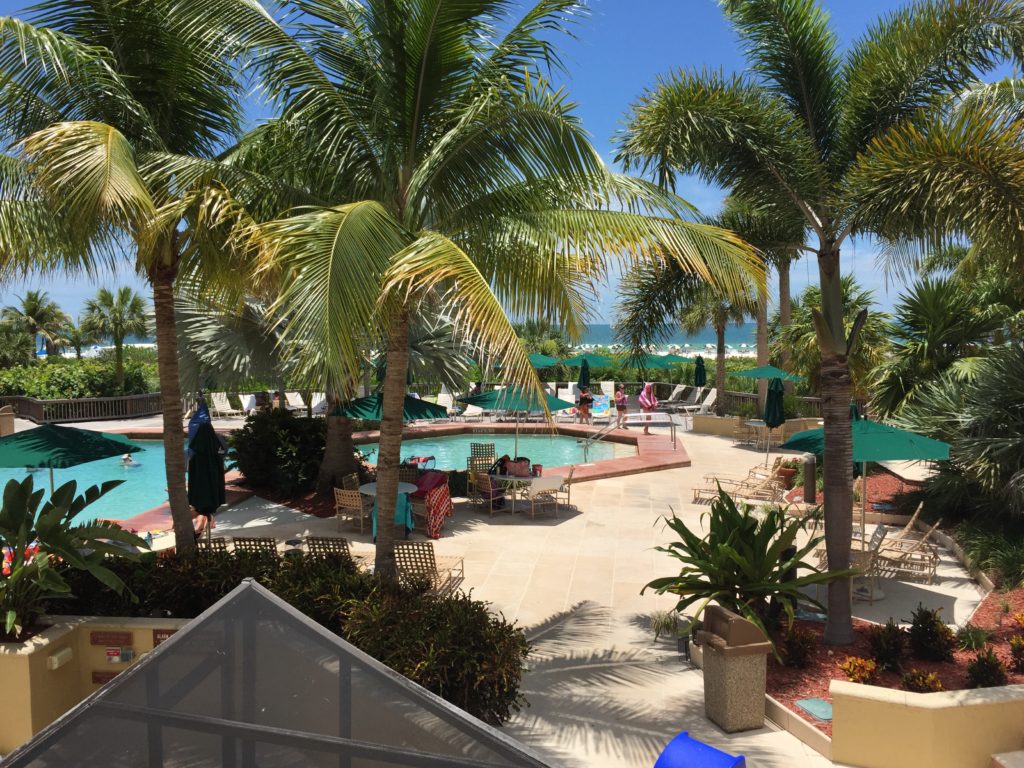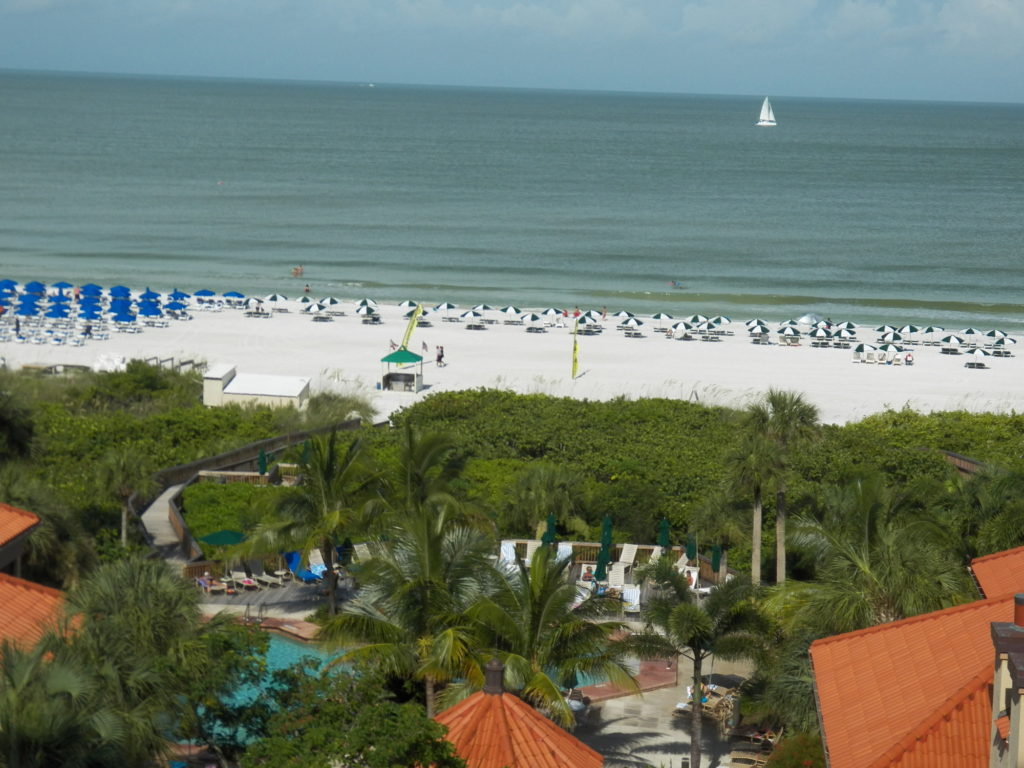Timeshare ownership is a controversial topic for some people, but for our family, owning a timeshare has brought us together and created many happy memories.
Our experience with timeshare resorts dates back to the 1980s. Kathy and I got one of those offers in the mail we couldn’t refuse. For a $100 donation to the American Cancer Society, we could enjoy a three-day vacation at a new oceanfront resort on Marco Island, Florida. We were young marrieds, living in Central Florida, and had never visited Marco Island, so we thought to ourselves, why not? We took the bait and scheduled a trip.

Eagle’s Nest is our family’s tropical oasis at the beach.
That weekend at Eagle’s Nest Beach Resort proved to be a life-changing one for us and our family. Sparkling new and situated on one of the prettiest beaches anywhere in the continental United States, Eagle’s Nest sold itself. We took the required 90-minute tour and were impressed that the sales staff was low-key and professional. They didn’t play games with us or deceive us. Their approach worked. We went home that weekend as giddy new owners of an annual timeshare week at Eagle’s Nest.
The next year, when time came for us to stay at our two-bedroom, two-bath condo unit at Eagle’s Nest, we took Kathy’s mother with us. She was an experienced world traveler but just as impressed by Eagle’s Nest as we were. She left that week with her own one-bedroom timeshare unit.
And so began a family saga that continues to this day. I am writing this blog post from the balcony at Eagle’s Nest, overlooking the Gulf of Mexico and the resort’s pool. We’re here on vacation yet again. When we made that first purchase more than 30 years ago, we could not have imagined how large a role Eagle’s Nest would play in our family’s story, or how near and dear to our hearts it would become.
More than three decades later, we still look forward to each year’s vacation as much as we did back then.
About timeshares
Nearly 10 million Americans own a timeshare, according to the American Resort Development Association, so odds are many of you are familiar with the concept. Timeshares allow middle-class people like us to own a spot at the beach, in the mountains, near a theme park, or at other popular tourist destinations. The average price of a beachfront condo on Marco Island is $895,882, so owning our own year-round place here is not possible. Hotels are expensive too. The JW Marriott, next door to Eagle’s Nest, starts at more than $2,200 per week for a standard hotel room with only one bed, no kitchen and no view of the beach. By comparison, timeshares, when bought right, can be a vacation bargain.
When you purchase a timeshare, you typically acquire either a once-a-year, fixed-week stay at your resort, or points that may be used to schedule an annual vacation at your resort. If you don’t wish to use your timeshare week, most resorts will allow you to rent it, which will help recoup your annual maintenance fees. If you want to vacation elsewhere, you can swap your timeshare week in a given year for a vacation week at another resort if you belong to an exchange organization such as RCI or Interval International. Some of the larger timeshare operators have their own internal exchange programs. While we usually return to Eagle’s Nest each year, over the years we have exchanged to timeshare resorts from Williamsburg, Virginia, to Las Vegas. We’ve never exchanged internationally, but that is possible too. Timeshare vacation ownership is a worldwide industry.
In the early days, timeshare resorts were primarily developed by smaller companies. Some were merely hotel conversions. Today, large hotel and tourism companies dominate the timeshare business. They include divisions of Hilton, Marriott, Disney, Hyatt, and Holiday Inn. This has added more credibility and stability to the industry. Newer resorts tend to be higher priced but larger and more luxurious.
While the quality and type of accommodations vary widely, as a general rule, timeshare units are more like condos than hotel rooms. Our units at Eagle’s Nest, for instance, have fully equipped kitchens, washers and dryers, TVs in all the bedrooms, and spacious screened balconies. This makes timeshares more relaxed and user-friendly for families versus staying at a hotel. Some timeshares offer large units with three or more bedrooms, making it possible for the whole family to vacation together.
Family time at the beach

Our children loved playing at Eagle’s Nest.
Our first child was still a toddler when we bought at Eagle’s Nest, and child No. 2 came along soon. Our daughters grew up enjoying annual treks to Eagle’s Nest. They experienced quality time with their grandparents, including playing at the beach, hanging out around the pool, and going out in the evenings to our favorite seafood restaurants. Sometimes, our girls would spend the night with the grandparents in their unit, or walk over first thing in the morning to have breakfast with them. Eagle’s Nest even provides an organized children’s program, which our girls enjoyed.
Sadly, Kathy’s parents have passed, but the multi-generational experience continues. Now, Kathy and I are the grandparents. One of our daughters has a toddler of her own, who has already made one visit to Eagle’s Nest and would be here with us this year if it weren’t for travel concerns related to the COVID-19 coronavirus. We’re looking forward to repeating the cycle and watching our granddaughter grow up vacationing here.
From talking with other owners here at Eagle’s Nest, our family’s experience is typical. I met a 35-year-old guy here the other day who was staying with his wife in his parents’ unit. He said he’d been coming to Eagle’s Nest “since he was in training pants,” to use his phrase. Lots of families buy multiple units so they can vacation together. Seeing three generations sitting around the pool or walking the beach is normal here. It’s a family kind of place with a happy vibe.

The ugly side of timeshares

Our daughters still enjoy coming to Eagle’s Nest for family vacations.
Not everyone has such a happy experience with timeshare ownership. Much of that has to do with the distasteful sales tactics too many timeshare resorts use. A quality timeshare resort, like Eagle’s Nest, should sell itself. Unfortunately, salespeople often use high-pressure techniques and don’t stick to the facts when selling timeshares. They entice prospects to the resort for so-called 90-minute tours that often go longer and do everything possible to force the prospects to make a decision on the spot. The timeshare concept is a sound one, but these sales tactics have given timeshares an otherwise undeserved bad reputation.
These high-pressure sales practices also result in people buying timeshare weeks on the spot who cannot afford them or are not in a position to benefit from them. Some buyers never stay at their timeshare and quickly grow tired of paying annual maintenance fees for vacation time they aren’t using.
Another problem with many timeshares is that they can be difficult to sell. With more than 200,000 units in the U.S. alone and nearly 10 million owners, there is always a glut of unit weeks for sale, especially at timeshares that don’t have the best locations or haven’t been updated or well managed. Some resorts, like Eagle’s Nest, maintain their own resale department. We put up a unit for sale here once and got a buyer in less than one week. Even with an on-site resale desk, however, some units can languish for months or years while waiting for a buyer.
How to buy a timeshare the right way
For senior adults, timeshares can be a great way to enjoy your own travel time or bring the family together for annual vacations. Here are some tips that will help you purchase wisely and have a positive experience:
- Do your research. Buying something as expensive as a timeshare shouldn’t be an impulse decision, but too often it is. If you want to be a smart timeshare buyer, do your research on markets and resorts. Know where you want to vacation. Visit timeshare resorts in that market if possible. Are the resorts in good repair and updated? Do they have the amenities that matter most to you, whether that be beach access, golf, or a marina. You can research timeshares online too at sites such as the Timeshare Users Group or TripAdvisor.
- Buy only on the resale market. The average purchase price for new timeshare units that allow one-week annual stays or the equivalent points is more than $21,000, according to the ARDA. These prices are inflated due to high upfront marketing and sales costs. Like buying a new car, you can expect significant depreciation when you buy a timeshare new from the developer.
For much better pricing, buy a resale timeshare unit (weeks or points) from another individual. This can be done through the resort’s resale desk, if there is one, or through resale companies such as Redweek.com or Timeshare Users Group. Prices for resale units are significantly lower than those bought new from the developer. - Buy in your home country. If you visit popular international resorts like Cancun, odds are good someone will try to sell you a timeshare there. Don’t do it. First, no matter how attractive the resort, is it in a location you are likely to want to visit nearly every year? Second, when you buy outside the U.S. (or your home country), you don’t have the legal and consumer protections you have at home. If problems arise, it could get complicated. Speaking of which, buying property in another country can also complicate your estate plan. With nearly 1,600 timeshare resorts in the U.S., why ask for trouble by buying abroad?
- Don’t buy for the wrong reasons. Uninformed or unscrupulous timeshare sales people often sell timeshares as “investments,” which they are not. You may love your timeshare like Kathy and I love Eagle’s Nest and have wonderful experiences there for the rest of your life, but the reality is that when the time comes to sell, you will be lucky to get back your full original price, especially if you bought from the developer. A timeshare is a vacation experience, not an investment.
How snowbirds can benefit from timeshares
Millions of retirees love to spend winters in warm havens like Florida and Arizona. For some of them, it may be worth considering the strategy of buying timeshare weeks for your winter lodging. In other words, owning a few weeks during the winter at one or more timshare resorts may be an alternative to owning a second home, maintaining a large RV or motorhome, or renting a condo or house. You’ll have to do the math to see if this works for you, factoring in the costs to purhase the timeshare and the annual maintenance fees.
Our Family’s Future at Eagle’s Nest

Multi-generational fun at Eagle’s Nest
We look forward to many more years of vacationing in beautiful Marco Island, thanks to our timeshare ownership at Eagle’s Nest Beach Resort. We can’t wait to spend future vacation time with our daughters and their husbands, and to watching our granddaughter enjoy the resort like our children did. When we pass, our deeded property at Eagle’s Nest will pass to our children, who will hopefully keep the tradition alive for another generation.
For our family, purchasing a timeshare week was one of the best decisions we’ve made.
* * * * *
Note to readers: This story represents our family’s personal experience and opinions. We are not being compensated by Eagle’s Nest or any of the other entities mentioned in this story.
Got comments? We love to hear from our readers! Please scroll down and add your comments in the section below.
* * * * *
Subscribe via email for free to receive all future stories from This Retirement Life. Our blog explores topics of interest to retirees and those planning for retirement. Please see subscription information to the right of this story or below, and sign up today.









Hi Dave, I can’t wait for you and Kathy to ask us to the Eagles’s Nest to SHARE a week with y’all. ha ha.
My brother and sister in law also enjoys their time share and once I went with them to Hawaii. They find a different fun place to go each year or skip a year and go someplace for two weeks the next year or spend their points on an upgrade. I wonder if buying a time share as a retired person is a good idea. It seems like buying one when your younger and raising a family makes more since. Walt and I would be interested in one with a Marina and at least a couple of weeks, but that sounds rather expensive.
You and Walt will have to come visit us here sometime. Bring your boat when you come! (ha)
I’m sure there are timeshares with marinas, but don’t know offhand.
Good article Dave. We purchased 2 weeks in Sebastian back in early 80s also. It is fun watching our grandkids play with the grandkids of our friends there that purchased 40 years ago. Now we use one week to rent out and that covers fees for both weeks. Also enjoyed “exchanging” to other locations.
The multi-generational family gatherings are what make timeshares so enjoyable for many of us, especially at this time of life. Glad you are enjoying your timeshare too. Thanks for commenting.
Great article but I do have a comment. As a Realtor, there is a difference between timeshares and fractional ownership. In timeshare you purchase a red week, blue week, gold week, etc. With Eagles Nest you purchased a fractional ownership…which means you received a Warranty Deed for a specific week in a specific unit. ie, Week 1 , Unit 2108, Eagles Nest. It is a recorded Warranty Deed. With timeshares you may not know the exact location of where you will be staying. A Warranty Deed is the same as you received when you purchased your house. Most timeshares are managed by a big company with no owner participation. Fractional ownership usually has a board of directors like we have at Eagles Nest made up of owners of the project. We started out with one week and now we are the proud owners of 9 weeks. Yes, it has been the best for our family and we enjoy every minute.
I live at the Lake of the Ozarks, Missouri, and we have a private golf course, Porto Cima, where there are also fractional ownerships available in Private Quarters. A little different on their scheduling but you also receive a Warranty Deed.
Time Share is used as a generic name but with Eagles Nest is it a fractional ownership….I would not have purchased otherwise. Love the place!
Thanks for your explanation, Margie. Glad you enjoy Eagle’s Nest like we do.
Great article Dave.
Thanks, Lisa.
Yeah but what happens when circumstances change and/or your family doesn’t want it anymore? That’s the real pain in owning a TS. You can’t even give it away. They don’t have value.
In some cases, that is true, in which case your best bet may be to continue owning it and rent it out each year to recoup your maintenance fees. The better (popular location, good amenities, and well maintained) timeshare resorts usually do have a resale value, even if it’s not as much as you paid for it. You should be able to recoup at least part of your original investment on the sale. Does your resort have an in-house resale program for owners? That can be a good place to start.
I appreciate that you elaborated on the benefits everyone can get by owning a timeshare, and how doing it changed your life dramatically because of all the benefits you can get. My husband and I have been thinking about buying a timeshare to be able to spend time with our family and parents, I will definitely consider what you talked about and I will pass this on to my husband so that we start looking for a realtor.
Best wishes to you and your husband on your search for a timeshare. Without rehashing what’s in the article, it may help to know that some timeshares have their own resale desks to facilitate owners wanting to sell. That’s in addition to the other means for buying resale weeks mentioned in the article. I definitely think that buying a resale unit (not a new one from the developer) is the best way to go.
This is the best article I have read about timeshare ownership! We own several timeshares. Some we inherited. Some we purchased from the developer, and some we brought at a low price from a direct seller. My advice is to purchase at a location that you love going to. A timeshare kind of makes you take vacations – which is a good thing because we can get caught up in our busy lives and forget to take a break.
Thank you for your comment! I agree with your advice 100 percent. Our family loves our timeshare snd its location at the beach.